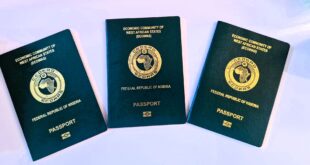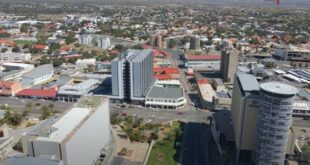Following a directive to suspend the registration of new SIM cards nationwide, Nigerians with existing SIM cards have been directed to update their SIM registration details with their National Identification Number (NIN), sparking angry reactions. Our correspondent Abeeb Alawiye reports from Abuja
—-
Nigerian Communications Commission (NCC), said in a statement on Tuesday that the country’s Minister of Communications and the Digital Economy, Isa Pantami, had given subscribers until 30 December 2021 to update their details or risk being blocked.
It also means that no new SIM card or SIM swap will be issued to anyone who loses his or her SIM card at the moment and foreigners are also expected to use their passports when registering their SIM cards.
Those coming into Nigeria, for the first time, would also not have access to any SIM card.
Meanwhile, the country’s House of Representatives, has urged the NCC to extend its ultimatum to block phone numbers without NIN by 10 weeks in other to enable Nigerians submit their national identity numbers to service providers.
The major telephone networks in Nigeria are MTN, Globacom, Airtel and 9Mobile.
Following the directive, the Federal Road Safety Corps (FRSC) has also announced a new directive requiring National Identification Number for citizens to get driver’s licence.
According to the commission, all driver’s license applicants are to present their NIN from 21 December 2020, before they can be attended to, adding that there would be no waiver for anyone.
But this directive raises a number of questions. How will millions of subscribers update their NIN in just two weeks? Will it have any negative impact in the fight against COVID-19 pandemic in the country considering the country has now entered second wave of the infections?
Here’s what we know:
With a population of 200 million, the west African country has an estimate of over 198 million active mobile lines.
According to the NCC, there were over 152 million Internet subscribers as of October 2020.
However, NCC and Nigeria’s population figures suggest that many mobile phone users have more than one SIM card.
According to the National Identity Management Commission (NIMC), only about 42 million Nigerians had a National Identification Number (NIN) as of September 2020. Interestingly, the body has been on this task since its establishment in 2007, and the process has been plagued with several difficulties which it is yet to solve.The registration could take you anything from a day to 2 weeks, depending on circumstances such as queues, availability of power, Internet or a registration officer.
Nigerians react to difficulties in getting NIN and the two weeks deadline
Many Nigerians have complained about the delay in the production of National ID card and wondered why that should not be sorted out before giving a deadline of linking SIM cards of over 100 million Nigerians in two weeks.
Here are some comments gathered by this reporter on Twitter:
A Twitter user identified as Morris Monye @Morris_Monye, said “In my expert opinion, I predict the NIMC threat is all “huff and puff” There is no way 100m+ SIMS will be blocked. The repercussions will kill the already collapsed economy FINTECH will collapse, banking will suffer, Telcos will experience monumental loss… A domino effect.”
@SavvyRinu “When they give a stupid directive, give them stupid reactions. If NCC refuses to shift the 2-week deadline, we will all refuse to do the NIMC. If they born NCC well, they should block the phone numbers of over 100 million of people. This is a democracy.”
@surayyah__ahmad “Allow those with BVN to use their BVN as a form of verification and generate NIN online.
Those without BVN can do the physical registration.
It reduces the pressure on the physical @nimc_ng centres and creates an opportunity for integration.
We just like to make people suffer.”
@CakeMaestro042“I registered for my NIN 2weeks ago, & I was told to come back for the temporal slip which has my NIN in 2weeks.
Everyday I pass through most teleco offices, there’s usually a long queue waiting to upgrade.
Do you now see, that this isn’t possible in 2weeks?”
@DrJoeAbah “I understand that the @nimc_ng mobile app when launched will make it possible for citizens to link their SIMs to their NINs by themselves. I hope that @NgComCommission will wait for this to happen first, while asking Telcos to link registered SIMs to existing NINs.”
Why is the government demanding NIN?
The Minister stated that the measure is to improve the integrity and transparency of the SIM registration process and consolidate the achievements of the SIM registration exercise of 2019.
All these have been linked to the bigger goal of attaining a widespread digital identity database and improving security in Nigeria.
How will this affect the economy?
If the deadline is not shifted, it could have telling ripple effects on the economy. According to figures from the National Bureau of Statistics, the telecom sector has contributed ₦31.8 trillion ($83.6 billion) to the country’s Gross Domestic Product (GDP).
In Q3 2020, it contributed 17.36% to Nigeria’s GDP, making it one of the best performing sectors in a quarter when the country fell into recession.
If millions of subscribers are blocked, it is possible that the sector might contract further in the turn of the year.
Part of the directive given by the Nigerian government is to totally suspend the registration of new SIM cards by all operators which means telcos are currently not making money from selling SIM cards to new users.
The directive also stated that “after the deadline, all SIMs without NINs are to be blocked from the networks. This means telcos could be losing millions of subscribers if it failed to meet up with the two weeks deadline.
Finally, the government also said, violators of this directive will be met by stiff sanctions, including the possibility of withdrawal of operating license.
Fear of high spike of COVID-19 cases
There is no denying fact that whether or not the government extends the December 30 deadline, Nigerians will troop out to ensure they all get their NIN and if the process is just like before, it might lead to crowds and long queues across the nation, a move that will further expose people to contract COVID-19.
On 17 December 2020, the country recorded 1,145 new cases of COVID-19 bringing the total cases to 76,207 with 1201 deaths across the 36 states including FCT. Over 67,000 patients have recovered.
 THE AFRICAN COURIER. Reporting Africa and its Diaspora! The African Courier is an international magazine published in Germany to report on Africa and the Diaspora African experience. The first issue of the bimonthly magazine appeared on the newsstands on 15 February 1998. The African Courier is a communication forum for European-African political, economic and cultural exchanges, and a voice for Africa in Europe.
THE AFRICAN COURIER. Reporting Africa and its Diaspora! The African Courier is an international magazine published in Germany to report on Africa and the Diaspora African experience. The first issue of the bimonthly magazine appeared on the newsstands on 15 February 1998. The African Courier is a communication forum for European-African political, economic and cultural exchanges, and a voice for Africa in Europe.

































